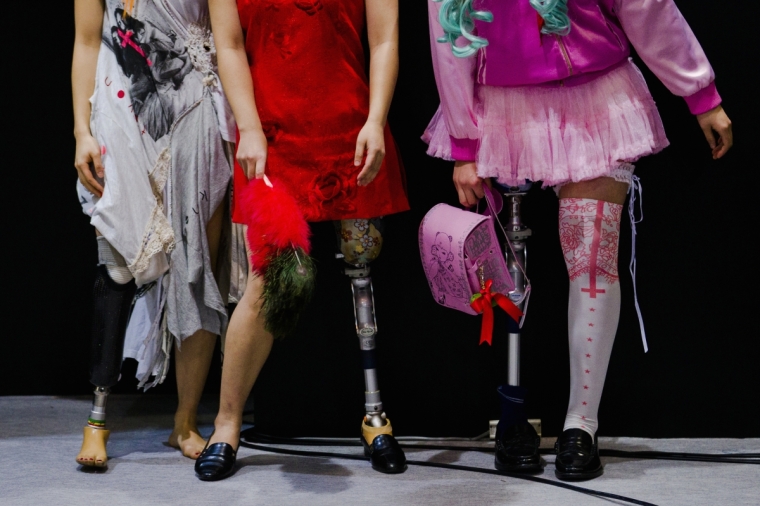'Transabled' seek acceptance for disabling, self-mutilating acts

OTTAWA, Canada (Christian Examiner) - Transgenderism received renewed attention recently when Olympic gold medalist and reality television star Bruce Jenner publicly moved into life as "Caitlyn" Jenner in an attempt to resolve what he claims has been a lifelong struggle of feeling like a female living inside the body of a biological male.
According to the National Post, the increasing acceptance by society of transgendered individuals is leading another group of people who feel uncomfortable in their bodies to push for greater acceptance – the "transabled."
Canadian researcher Alexandre Baril, who presented a white paper to the Congress of the Social Sciences and Humanities at the University of Ottawa, said transability is the desire or need for an able-bodied person to obtain a physical impairment.
"The person could want to become deaf, blind, amputee, [or] paraplegic," Baril said. "It's a really, really strong desire."
Clive Baldwin, a Canada Research Chair in Narrative Studies who teaches social work at St. Thomas University in Fredericton, N.B. interviewed 37 transabled people around the world. He suggests transability is a form of body diversity for which amputation serves a similar purpose as cosmetic surgery – helping someone to appear as his or her ideal self.
Transabled people often stage "accidents" such as cutting themselves with power tools or dropping concrete blocks on body parts to purposely cause self-inflicted debilitating injuries.
Despite the parallel between transgender and transabled persons feeling like imposters in their bodies they were born with, the transgender community has tried to distance itself from the transability movement. Baril believes this is due to concentrated efforts by the transgendered community to remove "gender dysphoria" as a pathological condition from the Diagnostic and Statistical Manual of Mental Disorders. Transability was added to the Manual in 2013.
Assistant Professor of Humanities Stephen Mizell of the College at Southwestern in Fort Worth, Texas said this is a problem.
"This would mean that transgendered people understand transability as a disorder but do not recognize being transgendered as a disorder," Mizell told Christian Examiner. "What basis does the transgendered community have for saying this? In both cases, transability and being transgendered are based on an individual's feeling that he or she is not in the right body."
Mizell continued: "This prejudice from the transgendered community should be alarming, but more alarming is the fact that if transability should not be thought of as a disorder because it parallels the experience of being transgendered, then it follows that any state where people feel that they are not in the right body—any trans-type state—should not be thought of as a disorder.
"Someone who feels like he is a dog trapped in a human body, someone who feels like he is a martian trapped in a human body, someone who feels like he is a block of cheese trapped in a human body," he said, for instance, "all of these would not be disorders if it is the case that being transgendered is not a disorder. Indeed one's imagination is the limit to the number of different kinds of things someone could claim to be while trapped in a human body."
For Christians attempting to evaluate these social movements, Mizell points to the apostle Paul's writing in Philippians 4:10-13 regarding contentment in all circumstances. Mizell believes this learned contentment can apply to body image.
"One may or may not like the body that one has been given (similar to the way Paul most likely did not like being in need or facing hunger), but liking or disliking something is not synonymous with being content," he said.
"Being content means accepting that something is sufficient – in this case, that the body that one has been given is sufficient or adequate for the purpose for which it is designed," Mizell continued, pointing out that the apostle Paul found his strength to be content in Christ which emphasizes the role of personal faith in Christ for true contentment.
Mizell said the Bible never advocates self-mutilation but rather condemns it in Leviticus 21 as one of the pagan behaviors God's people were forbidden to practice.
In Ephesians 5:29 is one example of New Testament teaching that advocates care for the human body, Mizell said. Self-mutiliation is equivalent to suggesting that the body God provided is somehow insufficient or inadequate.
"All of this is not a reflection of something normal. It is abnormal, the effects of sin on both our bodies and souls," Mizell concluded. "It is the abnormality caused by sin that creates the struggles of self-image, however subtle or acute those struggles may be. But these struggles are what drive us to realize that Christ's grace is sufficient for us, that His power is made perfect in our weakness," he said citing 2 Cor. 12:9-10.